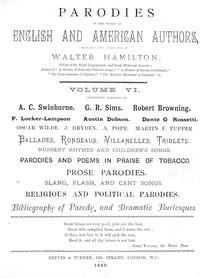|
|
Read this ebook for free! No credit card needed, absolutely nothing to pay.Words: 469337 in 211 pages
This is an ebook sharing website. You can read the uploaded ebooks for free here. No credit cards needed, nothing to pay. If you want to own a digital copy of the ebook, or want to read offline with your favorite ebook-reader, then you can choose to buy and download the ebook.

: Parodies of the works of English & American authors vol. VI by Hamilton Walter Compiler - Parodies@FreeBooksThu 08 Jun, 2023 NOTES 335 INDEX 361 INTRODUCTION. BY SIR ALFRED C. LYALL. At different times in the world's history the nations foremost in civilization have undertaken the enterprise of founding a great European dominion in Asia, and have accomplished it with signal success. The Macedonian Greeks led the way; they were followed by the Romans; and in both instances their military superiority and organizing genius enabled them to subdue and govern for centuries vast populations in Western Asia. European science and literature flourished in the great cities of the East, where the educated classes willingly accepted and supported foreign rulership as their barrier against a relapse into barbarism; nor have we reason for believing that it excited unusual discontent or disaffection among the Asiatic peoples. But the Greek and Roman Empires in Asia have disappeared long ago, leaving very little beyond scattered ruins; and in modern times it is the British dominion in India that has revived and is pursuing the enterprise of ruling and civilizing a great Asiatic population, of developing the political intelligence and transforming the ideas of an antique and, in some respects, a primitive society. That the task must be one of prodigious difficulty, not always free from danger, has been long known to those who watched the experiment with some accurate foresight of the conditions attending it. Yet the recent symptoms of virulent disease in some parts of the body politic, though confined to certain provinces of India, have taken the British nation by surprise. Mr. Chirol's book has now exhibited the present state and prospect of the adventure; he has examined the causes and the consequences of the prevailing unrest; he has collected ample evidence, and he has consulted all the best authorities, Indian and European, on the subject. His masterly analysis of all this material shows wide acquaintance with the facts, and rare insight into the character and motives, the aims and methods, of those who are engaged in stirring up the spirit of revolt against the British Government. He has pointed to instances where the best intentions of the administrators have led them wrong; his whole narrative illustrates the perils that beset a Government necessarily pledged to moral and material reform, which finds its own principles perverted against its efforts, and its foremost opponents among the class that has been the first to profit by the benefits which that Government has conferred upon them. The nineteenth century had been pre-eminently an era of the development of rapid and easy communication between distant parts of the world, particularly between Europe and Asia. So long as these two continents remained far apart the condition of Asia was unchanged and stationary; if there was any change it had been latterly retrogressive, for in India at any rate the eighteenth century was a period of abnormal and extensive political confusion. In Europe, on the other hand, national wealth, scientific discoveries, the arts of war and peace, had made extraordinary progress. Population had increased and multiplied; and partly by territorial conquests, partly by pacific penetration, the Western nations overflowed politically into Asia during the nineteenth century. They brought with them larger knowledge, novel ideas and manners, which have opened the Asiatic mind to new influences and aspirations, to the sense of needs and grievances not previously felt or even imagined. The effect, as can now be clearly perceived, has been to produce an abrupt transition from old to new ways, from the antique order of society towards fresh models; and to this may be ascribed the general unsettlement, the uneasy stir, that pervade Asia at the present moment. Its equilibrium has been disturbed by the high speed at which Europe has been pushing eastward; and the principal points of contact and penetration are in India. That in India the British Government has found the centres of active disaffection located in the Maratha country and in Lower Bengal, is a phenomenon which can be to a large extent accounted for by reference to Anglo-Indian history. The fact that Poona is one focus of sedition has been attributed in this volume to the survival among the Maratha Brahmins of the recollection that "far into the eighteenth century Poona was the capital of a theocratic State in which behind the Throne of the Peshwas both spiritual and secular authority were concentrated in the hands of the Brahmins." The Peshwas, as their title implies, had been hereditary Ministers who governed in the name of the reigning dynasty founded by the famous Maratha leader Sivajee, whose successors they set aside. But before the end of the eighteenth century the secular authority of the Peshwas had become almost nominal, and the real power in the State had passed into the grasp of a confederation of chiefs of predatory armies, whose violence drove the last Peshwa, more than a century ago, to seek refuge in a British camp. The political sovereignty of the Brahmins had disappeared from the time when he placed himself under British protection; and the Maratha chiefs only acknowledged our supremacy after some fiercely contested battles; with the result that they were confined to and confirmed in the possession of the territories now governed by their descendants. But it is quite true that to the memory of a time when for once, and once only, in Indian history, their caste established a great secular dominion, may be ascribed the tendency to disloyalty among the Maratha Brahmins. The case of Bengal is very different. Poona and Calcutta are separated geographically almost by the whole breadth of India between two seas; yet the historical antecedents of the Bengalees and Marathas are even further apart. The Marathas were the leaders of revolt against the Moghal Empire; they were formidable opponents to the rise of the British power; their chiefs fought hard before yielding to British authority. On the other hand, Lower Bengal belonged to a province that had fallen away from the Moghal Empire, and which was transferred from its Mahomedan Governor to a British General by the result of a single battle at Plassey. The Bengalees took no part in the contest, and they had very good reason for willing acquiescence in the change of masters. In a comparison, therefore, of the Marathas with the people of Bengal, we have a remarkable instance of the production of similar effects from causes very distinct and dissimilar. In the former case their present unrest may be traced, in a large degree, to the memories of early rulership and to warlike traditions. In the latter case there can be no such recollections, military or political, for the country has had no experience whatever of a state of war, since Lower Bengal is perhaps the only considerable province of India which has enjoyed profound peace during nearly 150 years. It is no paradox to suggest that this prolonged tranquillity has had some share in stimulating the audacity of Bengalee unrest, for the literary classes seem to have no clear notion that the real game of revolutionary politics is necessarily rough and dangerous--certain, moreover, to fail whenever the British Government shall have resolved that it is being carried too far, and must end. But it is beyond question that the promoters of disaffection on both sides of India have been making strenuous exertions to enlist in the movement the influence of Brahminism; and upon this point the book rightly lays particular stress. The position and privileges of the Brahmins are rightly compared to those of the Levites; they are the depositories of orthodox tradition; they preside over and hold a monopoly for the performance of the sacred rites and offices; and ritual in Hinduism, as in most of the ancient religions, is the essential element; it is closely connected with the rules of caste, which unite and divide innumerable groups within the pale of Hinduism. And in India the peculiar institution of caste, the strict regulation of social intercourse, particularly in regard to inter-marriage and the sharing of food, prevails to an extent quite unknown elsewhere in the world. The divisions of caste have always operated to weaken the body politic in India, and thus to facilitate foreign conquest; but, on the other hand, they have opposed a stiff barrier to the invasion of foreign religions, to the fusion of alien races with the Hindu people, and to any success in what may be called national unification. Free books android app tbrJar TBR JAR Read Free books online gutenberg More posts by @FreeBooks

: Comedias tomo 3 de 3 by Aristophanes BCE BCE Bar Ibar Y Zum Rraga Federico Translator - Athens (Greece) Drama; Aristophanes Translations into Spanish; Greek drama (Comedy) Translations into Spanish@FreeBooksThu 08 Jun, 2023
|
Terms of Use Stock Market News! © gutenberg.org.in2025 All Rights reserved.






